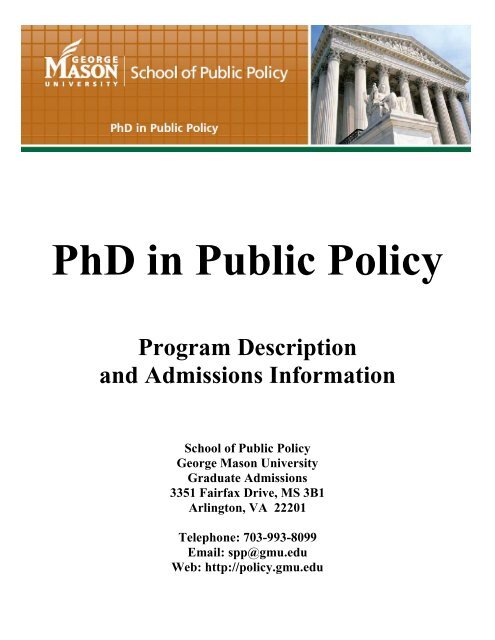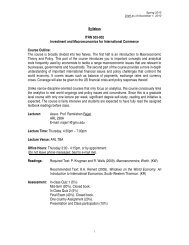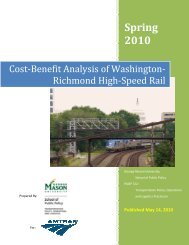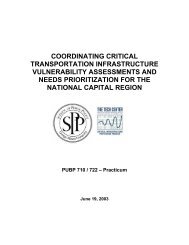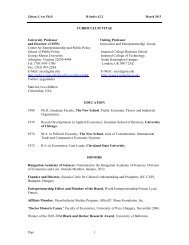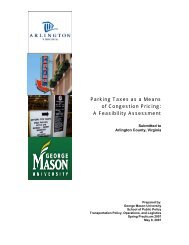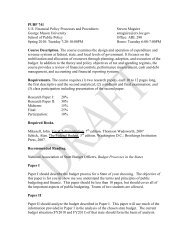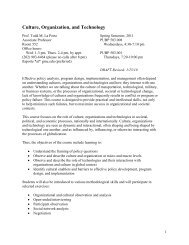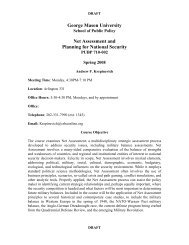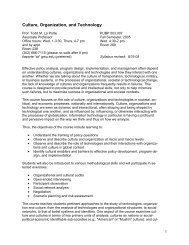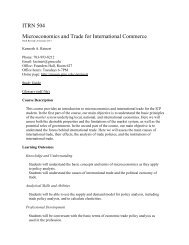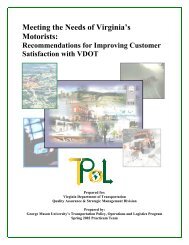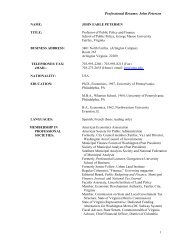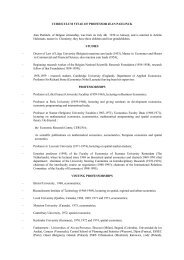PhD Program Description and Booklet - George Mason University
PhD Program Description and Booklet - George Mason University
PhD Program Description and Booklet - George Mason University
You also want an ePaper? Increase the reach of your titles
YUMPU automatically turns print PDFs into web optimized ePapers that Google loves.
<strong>PhD</strong> in Public Policy<br />
<strong>Program</strong> <strong>Description</strong><br />
<strong>and</strong> Admissions Information<br />
School of Public Policy<br />
<strong>George</strong> <strong>Mason</strong> <strong>University</strong><br />
Graduate Admissions<br />
3351 Fairfax Drive, MS 3B1<br />
Arlington, VA 22201<br />
Telephone: 703-993-8099<br />
Email: spp@gmu.edu<br />
Web: http://policy.gmu.edu
<strong>PhD</strong> in Public Policy-<strong>Program</strong> Guide<br />
Table of Contents<br />
I. SCHOOL OF PUBLIC POLICY AND DOCTORAL PROGRAM OVERVIEW ………. Page 3<br />
II. SPP ADMINISTRATION AND FACULTY ……………………………………………. Page 4<br />
III. PHD PROGRAM REQUIREMENTS…………………………………………………… Page 9<br />
IV. PHD PROGRAM, FIELDS OF STUDY………………………………………………….. Page 11<br />
V. PUBLIC POLICY COURSE DESCRIPTIONS ………………………………….……… Page 13<br />
VI. GMU LIBRARIES AND RESOURCES …………………………………………………. Page 15<br />
VII. ADMISSIONS AND APPLICATION INFORMATION ………………………………… Page 16<br />
VIII. FINANCIAL AID AND COST INFORMATION ...……………………………………. Page 17<br />
This Guide incorporates most of the requirements <strong>and</strong> rules pertaining to the <strong>PhD</strong> <strong>Program</strong> in the School of Public Policy. In addition,<br />
the <strong>University</strong> catalog <strong>and</strong> associated requirements <strong>and</strong> rules, along with other pertinent <strong>University</strong> policies apply to, <strong>and</strong> in the case of<br />
inconsistency, take precedence over this Guide.<br />
Revised: June 25, 2013<br />
2
SCHOOL OF PUBLIC POLICY<br />
OVERVIEW<br />
The School of Public Policy (SPP) is at the heart of <strong>George</strong> <strong>Mason</strong> <strong>University</strong>'s commitment to policy studies <strong>and</strong><br />
research. Located in Arlington, Virginia, SPP takes advantage of its location in the National Capital Region, offering<br />
students <strong>and</strong> faculty unique opportunities to study federal executive <strong>and</strong> legislative policy-making, as well as agency<br />
policy activities.<br />
The School of Public Policy conducts policy research in a number of fields, including regional economic development,<br />
transportation policy, science <strong>and</strong> technology policy, electronic commerce <strong>and</strong> organizational informatics, governance <strong>and</strong><br />
public management, <strong>and</strong> economic policy.<br />
The structure of the school <strong>and</strong> its dedication to interdisciplinary education <strong>and</strong> research allow it to reach across the<br />
<strong>University</strong> to bring together the knowledge <strong>and</strong> skills needed to address a wide variety of policy concerns. While most of<br />
the core faculty holds full-time, tenured positions, other members of the SPP faculty are from other university departments<br />
<strong>and</strong> schools. In addition, faculty <strong>and</strong> students in SPP are published widely in primary academic <strong>and</strong> professional journals,<br />
on topics including American policy <strong>and</strong> politics, comparative politics, legislative <strong>and</strong> executive branch operations,<br />
federalism, environmental policy, <strong>and</strong> national security <strong>and</strong> foreign affairs policies. In addition to the academic faculty<br />
<strong>and</strong> graduate students, SPP hosts a substantial number of senior fellows, visiting faculty, post-doctoral associates, <strong>and</strong><br />
other researchers from around the world, all of whom makes essential contributions to research, teaching, <strong>and</strong> outreach<br />
activities.<br />
SPP emphasizes alternative approaches to policy decision-making. These approaches result from a view that social <strong>and</strong><br />
economic changes caused by continuing innovations in modern technology require modifications in the substance of<br />
public policy, as well as in the way in which public decisions are made. SPP contributes to new concepts in policy<br />
formation, while building on the fundamental, pluralistic, democratic characteristics of policy making in the United States.<br />
Appropriate techniques of investigation <strong>and</strong> analysis are also emphasized. The School is committed to working closely<br />
with the <strong>University</strong>'s initiatives in computational science, information technology, bioinformatics, environmental science,<br />
conflict analysis <strong>and</strong> management, health, <strong>and</strong> other policy related fields.<br />
DOCTORAL PROGRAM OVERVIEW<br />
This doctoral program prepares its graduates to assume positions of significant responsibility in academia, government,<br />
<strong>and</strong> the private <strong>and</strong> public sectors. With a focus on analytical <strong>and</strong> research-based approaches to public policy, our<br />
students seek to underst<strong>and</strong> the underlying determinants of public policy choices, analyze <strong>and</strong> improve the<br />
implementation of policy, <strong>and</strong> identify <strong>and</strong> assess new opportunities to address emerging issues.<br />
The degree requires a minimum of 82 credit hours of course work <strong>and</strong> supervised research beyond the bachelor’s degree.<br />
The specific set of courses a student takes will depend on his or her preparation <strong>and</strong> substantive interests. However, all<br />
students are required to take a set of core courses or to present compelling evidence that they have achieved equivalency.<br />
A maximum of 30 transfer credits of relevant prior graduate work may be accepted toward the total of 82. The Doctoral<br />
<strong>Program</strong> Director will determine the amount of transfer credit awarded.<br />
3
SPP ADMINISTRATION AND FACULTY<br />
Mark J. Rozell, <strong>PhD</strong> Dean mrozell@gmu.edu (703) 993-4108<br />
David M. Hart, <strong>PhD</strong> Senior Associate Dean dhart@gmu.edu (703) 993-2279<br />
& Professor<br />
Roger R. Stough, <strong>PhD</strong> Associate Dean for Research rstough@gmu.edu (703) 993-2268<br />
Matthys van Schaik, <strong>PhD</strong> Associate Dean for Academic mvanscha@gmu.edu (703) 993-8227<br />
Affairs<br />
James Pfiffner, <strong>PhD</strong> Director, <strong>PhD</strong> in Public Policy pfiffner@gmu.edu (703) 993-1417<br />
Tennille Haegele Director of Graduate Admissions thaegele@gmu.edu (703) 993-8099<br />
Stephanie Floyd Associate Director of Graduate sfloyd@gmu.edu (703) 993-8099<br />
Admissions<br />
Morgan Fisher Assistant Director of Graduate mfisherb@gmu.edu (703) 993-8099<br />
Admissions<br />
Crystal Turner Graduate Admissions Assistant cturne16@gmu.edu (703) 993-8099<br />
Elizabeth Eck Assistant Dean for <strong>Program</strong> eeck@gmu.edu (703) 993-8225<br />
Management<br />
Shannon Williams Director, <strong>PhD</strong> Student Services swilli32@gmu.edu (703) 993-4143<br />
Susan McClure Assistant to the Dean mmcclure@gmu.edu (703) 993-4108<br />
FACULTY AND THEIR RESEARCH<br />
Zoltan J. Acs, <strong>University</strong> Professor; <strong>PhD</strong>, The New School, 1980. Globalization; entrepreneurship; philanthropy; development <strong>and</strong><br />
liberal democracy.<br />
Mark Addleson, Associate Professor; <strong>PhD</strong>, <strong>University</strong> of Witwatersr<strong>and</strong>, 1992. Knowledge management; organizational change;<br />
learning organizations; methodology of social inquiry; Austrian economics; organizational networks.<br />
Katrin B. Anacker, Assistant Professor; <strong>PhD</strong>, The Ohio State <strong>University</strong>, 2006. Housing; housing policy; urban policy; race <strong>and</strong><br />
public policy; real estate markets; statistical methods; qualitative methods; research writing.<br />
David J. Armor, Professor of Public Policy; <strong>PhD</strong>, Harvard <strong>University</strong>, 1966. Education policy; military manpower; family policy;<br />
welfare policy; civil rights/race relations policy (desegregation, affirmative action); welfare/poverty policy; methodology (statistical<br />
analysis, survey design).<br />
Philip E. Auerswald, Associate Professor; <strong>PhD</strong>, <strong>University</strong> of Washington, 1999. Innovation; entrepreneurship; economics of<br />
security; energy policy.<br />
Ann Baker, Professor of Public Policy; <strong>PhD</strong>, Case Western Reserve <strong>University</strong>, 1995. Organization change; group & organization<br />
communication to promote innovation; knowledge management; cross-cultural communication.<br />
Kenneth J. Button, <strong>University</strong> Professor; <strong>PhD</strong>, Loughborough <strong>University</strong>, U.K, 1981. Transportation economics; transport planning;<br />
economics of privatization <strong>and</strong> regulation; environmental economics; regional economics; urban economics.<br />
Audrey Kurth Cronin, Professor of Public Policy, DPhil, <strong>University</strong> of Oxford, U.K., 1985. International Relations, international<br />
security; ware <strong>and</strong> peace; strategy; terrorism; insurgency <strong>and</strong> political violence; how conflicts end.<br />
Janine Davidson, Assistant Professor of National <strong>and</strong> Global Security; <strong>PhD</strong>, <strong>University</strong> of South Carolina, 2005. International<br />
Security; U.S. foreign policy; civil <strong>and</strong> ethnic conflict; weak <strong>and</strong> failed states; terrorism.<br />
Desmond Dinan, Professor of Public Policy <strong>and</strong> Jean Monnet Chair; <strong>PhD</strong>, National <strong>University</strong> of Irel<strong>and</strong>, 1985. Global governance;<br />
European Union governance <strong>and</strong> institutions, history <strong>and</strong> historiography.<br />
John Earle, Professor of Public Policy <strong>and</strong> Economics; <strong>PhD</strong>, Stanford <strong>University</strong>, 1988. Labor economics <strong>and</strong> policies; human<br />
resource practices; transition; development; corporate governance <strong>and</strong> firm performance; reallocation; industry dynamics;<br />
entrepreneurship; inequality; globalization, growth <strong>and</strong> finance; political economy; institutional economics; comparative analysis of<br />
economic policies <strong>and</strong> systems; microeconometrics; program evaluation.<br />
4
Allison M. Frendak-Blume, Assistant Professor of Public Policy; <strong>PhD</strong>, Institute for Conflict Analysis & Resolution, <strong>George</strong> <strong>Mason</strong><br />
<strong>University</strong>, 2004. International peacekeeping; stability <strong>and</strong> reconstruction operations; post-conflict peacebuilding; conflict analysis<br />
<strong>and</strong> resolution; international supervisory/administrative regimes; U.S. foreign policy; Balkans; Russia/Former Soviet Union.<br />
A. Lee Fritschler, Professor of Public Policy; <strong>PhD</strong>, Maxwell School of Citizenship <strong>and</strong> Public Affairs, Syracuse <strong>University</strong>, 1965.<br />
U.S. national government (Executive); relationship between the institutions of government; accountability; regulation; federalism;<br />
public management; science <strong>and</strong> public policy; higher education policy; U.S. Postal Service <strong>and</strong> communications policy.<br />
Stephen S. Fuller, Dwight Schar Faculty Chair <strong>and</strong> <strong>University</strong> Professor of Public Policy <strong>and</strong> Regional Development; <strong>PhD</strong>, Cornell,<br />
1969. Regional economic development; urban development; housing; urban planning; demographics; the Washington area’s<br />
development; economic analysis; labor force; forecasting – population, income, employment, real estate development; economic <strong>and</strong><br />
fiscal impact analyses; economic development in developing countries.<br />
Jonathan L. Gifford, Professor of Public Policy <strong>and</strong> Director, Transportation Policy, Operations, <strong>and</strong> Logistics <strong>Program</strong>; <strong>PhD</strong>,<br />
<strong>University</strong> of California, Berkeley, 1983. Transportation policy <strong>and</strong> planning; infrastructure policy <strong>and</strong> planning; urban <strong>and</strong><br />
metropolitan planning <strong>and</strong> l<strong>and</strong> use; technology st<strong>and</strong>ards <strong>and</strong> public policy; transportation <strong>and</strong> regional development policy;<br />
transportation finance <strong>and</strong> privatization.<br />
Jack A. Goldstone, Virginia E. Hazel <strong>and</strong> John T. Hazel, Jr. Professor of Public Policy; <strong>PhD</strong>, Harvard <strong>University</strong>, 1981.<br />
Democratization; civil conflict; state failure <strong>and</strong> reconstruction; long-term social change; sources of economic growth; impact of<br />
demographic change on security.<br />
David M. Hart, Professor of Public Policy <strong>and</strong> Senior Associate Dean; <strong>PhD</strong>, Massachusetts Institute of Technology, 1995. Science<br />
<strong>and</strong> technology policy; U.S. public policy process; U.S. policy history, especially business, economic <strong>and</strong> political history;<br />
international migration; entrepreneurship; global governance; business <strong>and</strong> politics; energy innovation policy.<br />
Kingsley E. Haynes, Ruth D. <strong>and</strong> John T. Hazel M.D. Endowed Chair <strong>and</strong> <strong>University</strong> Professor; <strong>PhD</strong>, Johns Hopkins <strong>University</strong>,<br />
1971. Regional economic development; infrastructure <strong>and</strong> transportation policy; resource planning <strong>and</strong> policy analysis.<br />
Jessica Heineman-Pieper, Assistant Professor of Public Policy; <strong>PhD</strong>, The <strong>University</strong> of Chicago, 2005. Psychology <strong>and</strong> the<br />
conceptual foundations of science; philosophy of the social sciences; post-development studies; applied ethics; transformation;<br />
leadership; health policy <strong>and</strong> research; globalization <strong>and</strong> alternative paradigms; cultural diversity; conflict resolution; leadership.<br />
Jack C. High, Professor of Economics <strong>and</strong> Public Policy, Economics <strong>and</strong> Social Learning; <strong>PhD</strong>, UCLA, 1980.<br />
Economic regulation; economic growth; economic history; international trade <strong>and</strong> investment; international institutions.<br />
Christopher T. Hill, Professor Emeritus, <strong>PhD</strong>, <strong>University</strong> of Wisconsin, 1969. Science policy; technology policy; industrial<br />
innovation; R&D management; comparative science policy; space; energy; homel<strong>and</strong> security policy <strong>and</strong> planning.<br />
Andrew Hughes Hallet, Professor of Public Policy <strong>and</strong> Economics; DPhil, <strong>University</strong> of Oxford (Nuffield College), 1976.<br />
Open economy macroeconomics; policy coordination <strong>and</strong> exchange rate management; monetary integration (monetary <strong>and</strong> fiscal<br />
union in Europe); political economy models; fiscal policy; regionalism, policy choice <strong>and</strong> reform; the theory of economic policy <strong>and</strong><br />
institutional design; dynamic games <strong>and</strong> bargaining models; risk <strong>and</strong> decisions under uncertainty; commodity markets, financial policy<br />
<strong>and</strong> strategic trade policy; numerical methods in economics.<br />
Michael R. Kelley, Professor of Telecommunications; <strong>PhD</strong>, Catholic <strong>University</strong> of America, 1970. Telecommunications policy;<br />
polices for managing scarce radio frequency spectrum; government organizations <strong>and</strong> their approach to managing a variety of public<br />
assets (oil, gas, fishing, hunting, etc.).<br />
Sonia Ketkar, Assistant Professor, <strong>PhD</strong>, Temple <strong>University</strong>, 2006. Foreign entry <strong>and</strong> exit strategies; firm survival <strong>and</strong> performance;<br />
foreign subsidiary management; international entrepreneurship.<br />
Naoru Koizumi, Associate Professor; <strong>PhD</strong>, Hyogo College of Medicine, Japan, 2005, <strong>and</strong> <strong>University</strong> of Pennsylvania, 2002.<br />
Stochastic modeling; simulation of health care systems; applied statistics in health care; spatial statistics <strong>and</strong> applications of<br />
geographic information systems (GIS) in public health.<br />
Todd M. La Porte, Associate Professor; <strong>PhD</strong>, Yale <strong>University</strong>, 1989. Technologies <strong>and</strong> organizations; technology <strong>and</strong> society;<br />
technology <strong>and</strong> politics; technology in politics; technology assessment <strong>and</strong> policy analysis; information <strong>and</strong> communications<br />
technologies; energy technologies; digital government, both worldwide <strong>and</strong> in the U.S.; comparative political <strong>and</strong> economic systems,<br />
particularly European; critical infrastructures; large technical systems; high reliability organizations <strong>and</strong> organizational failure;<br />
organization studies; public management <strong>and</strong> public administration; qualitative methods; data collection methodologies; extreme<br />
events; disaster studies; emergency management; space weather.<br />
5
Siona Robin Listokin-Smith, Assistant Professor, <strong>PhD</strong>, <strong>University</strong> of California, Berkeley, 2007. Public finance; political economy;<br />
corporate social responsibility; corporate governance; retirement <strong>and</strong> welfare policy.<br />
Stuart S. Malawer, Distinguished Service Professor of Law & International Trade; <strong>PhD</strong>, <strong>University</strong> of Pennsylvania, 1976; Diploma,<br />
Hague Academy of International Law (Research Centre for International Law & International Relations) 1971; J.D., Cornell Law<br />
School, 1967. U.S. trade law; U.S. & global trade politics; international trade relations; World Trade Organization; national security<br />
law & policy.<br />
Jeremy D. Mayer, Associate Professor, <strong>PhD</strong>, <strong>George</strong>town <strong>University</strong>, 1996. Public opinion; racial politics; foreign policy;<br />
presidential elections; statistical methods; survey methods; media politics.<br />
Connie L. McNeely, Professor of Public Policy; <strong>PhD</strong>, Stanford <strong>University</strong>, 1990. Culture; states <strong>and</strong> society; international<br />
development; complex organizations <strong>and</strong> institutional analysis; comparative education; race, ethnicity, <strong>and</strong> nations; gender; social<br />
theory; science <strong>and</strong> technology policy.<br />
Arnauld Nicogossian, Distinguished Research Professor; M.D., Teheran <strong>University</strong>, 1964; Internal Medicine <strong>and</strong> Pulmonary<br />
Medicine Fellowship, Mount Sinai Medical Center/Elmhurst City Hospital, NY; M.S., Ohio State <strong>University</strong>, 1972; Board Certified<br />
Preventive Medicine/Aerospace Medicine, 1973. Public health policy; program/project management; strategic planning <strong>and</strong> execution<br />
of research <strong>and</strong> development; global public health <strong>and</strong> preventative medicine; aerospace medicine; internal medicine.<br />
Wayne D. Perry, Professor of Public Policy <strong>and</strong> Operations Research; <strong>PhD</strong>, Carnegie Mellon <strong>University</strong>, 1975.<br />
Science <strong>and</strong> engineering; information technology management <strong>and</strong> governance; international security <strong>and</strong> arms control; operations<br />
research/management science; statistical models; stochastic processes; managerial economics <strong>and</strong> econometrics; policy analysis; costbenefit<br />
analysis.<br />
James P. Pfiffner, <strong>University</strong> Professor of Public Policy <strong>and</strong> Director, Public Policy Doctoral <strong>Program</strong>; <strong>PhD</strong>, Wisconsin, 1975. The<br />
presidency; Congress; national security policy process; intelligence; public administration.<br />
Ramkishen S. Rajan, Professor of Public Policy; <strong>PhD</strong>, Claremont Graduate <strong>University</strong>, 2000. International economics (open<br />
economy macroeconomics, finance, <strong>and</strong> trade) with particular reference to Asia.<br />
Kenneth A. Reinert, Professor of Public Policy <strong>and</strong> Director, International Commerce <strong>and</strong> Policy <strong>Program</strong>; <strong>PhD</strong>, <strong>University</strong> of<br />
Maryl<strong>and</strong>, 1988. International trade policy; international development policy; multilateral development organizations; foreign direct<br />
investment.<br />
Edward Rhodes, Professor; <strong>PhD</strong>, Princeton <strong>University</strong>, 1985. International relations; international security; U.S. national security<br />
policy; U.S. foreign policy; U.S. naval strategy <strong>and</strong> force posture; American isolationism; identity <strong>and</strong> foreign policy.<br />
Hilton L. Root, Professor of Public Policy; <strong>PhD</strong>, <strong>University</strong> of Michigan, 1983. International economics; international finance;<br />
international development; developing nations; political economy of the design <strong>and</strong> implementation of development policy, economic<br />
policy reform; North-South relations <strong>and</strong> Asian-Pacific affairs.<br />
Mark J. Rozell, Dean, School of Public Policy <strong>and</strong> Professor of Public Policy; <strong>PhD</strong>, <strong>University</strong> of Virginia,1987. The presidency;<br />
media <strong>and</strong> politics; religion <strong>and</strong> politics.<br />
Catherine Rudder, Professor of Public Policy; <strong>PhD</strong>, Ohio State <strong>University</strong>, 1973. American political institutions <strong>and</strong> politics;<br />
Congress; tax policy making; self-regulation; governance; non-profit institutions.<br />
Stephen R. Ruth, Professor; <strong>PhD</strong>, <strong>University</strong> of Pennsylvania, 1971. Telecommunications policy; Higher Education policy—with<br />
emphasis on E-Learning; IT diffusion in developing nations; religious/theological issues in public policy formulation; knowledge<br />
management approaches in the public sector.<br />
Laurie A. Schintler, Associate Professor of Public Policy; <strong>PhD</strong>, <strong>University</strong> of Illinois at Urbana-Champaign, 1995.<br />
Critical infrastructure; transportation; quantitative methods; regional development; geographic Information Systems (GIS); network<br />
analysis; housing market.<br />
Louise Shelley, <strong>University</strong> Professor of Public Policy; <strong>PhD</strong>, <strong>University</strong> of Pennsylvania, 1977. Transnational crime; terrorism;<br />
corruption; human trafficking; illicit trade; Soviet successor states.<br />
Rainer Sommer, Associate Professor of Public Policy <strong>and</strong> Enterprise Engineering; <strong>PhD</strong>, Columbia Pacific <strong>University</strong>, 1991, <strong>and</strong><br />
<strong>George</strong> <strong>Mason</strong> <strong>University</strong>, 1998. Enterprise business systems, strategic planning <strong>and</strong> telecommunications.<br />
6
Roger R. Stough, Associate Dean for Research , NOVA Endowed Chair <strong>and</strong> Professor of Public Policy; <strong>PhD</strong> Geography <strong>and</strong><br />
Environmental Engineering, Johns Hopkins <strong>University</strong>, 1978. Regional economic development policy <strong>and</strong> analysis; information<br />
technology policy; transportation policy; entrepreneurship.<br />
Tojo J. Thatchenkery, Professor of Organization Development <strong>and</strong> Director, Organization Development <strong>and</strong> Knowledge<br />
Management <strong>Program</strong>; <strong>PhD</strong>, Case Western Reserve <strong>University</strong>, 1994. Enhancing innovation <strong>and</strong> entrepreneurship with Appreciative<br />
intelligence; Creating knowledge sharing organizational culture; social capital <strong>and</strong> organizational mobility challenges of Asian<br />
Americans; Information communication technology (ICT) <strong>and</strong> economic development of India.<br />
Susan Tolchin, <strong>University</strong> Professor; <strong>PhD</strong>, New York <strong>University</strong>, 1968. Public policy theory; federal government (US); federal<br />
regulation; ethics; political patronage.<br />
Matthys van Schaik, Associate Dean for Academic Affairs; <strong>PhD</strong>, <strong>University</strong> of South Carolina, 1995. International commerce <strong>and</strong><br />
research methods.<br />
Anne L. Washington, Assistant Professor of Public Policy, <strong>PhD</strong>, The <strong>George</strong> Washington <strong>University</strong>, 2011. Information Systems <strong>and</strong><br />
Technology Management. American government; Congress; eGovernment/Gov 2.0; enterprise systems; human-computer interaction;<br />
information retrieval; information technology <strong>and</strong> politics; knowledge management; legislative studies; qualitative methods; social<br />
theory; technology management.<br />
Janine R. Wedel, Professor; <strong>PhD</strong> <strong>University</strong> of California, Berkley, 1985.Governance <strong>and</strong> privatization of policy; corruption <strong>and</strong> the<br />
state; foreign aid; social networks; eastern Europe; anthropology of public policy.<br />
Edmund J. Zolnik, Assistant Professor; <strong>PhD</strong>, <strong>University</strong> of Connecticut, 2004. Community <strong>and</strong> regional development; safe <strong>and</strong><br />
sustainable transportation; multilevel modeling.<br />
Selected Affiliated Faculty<br />
Kevin Avruch, Henry Hart Price Professor of Conflict Resolution <strong>and</strong> Professor of Anthropology; <strong>PhD</strong>,<br />
<strong>University</strong> of California, San Diego, 1978.<br />
Timothy Conlan, <strong>University</strong> Professor of Government <strong>and</strong> Politics; <strong>PhD</strong>, Harvard, 1981.<br />
Robert L Dudley, Professor of Government <strong>and</strong> Politics; <strong>PhD</strong>, Northern Illinois <strong>University</strong>, 1980.<br />
Gregory A. Guagnano, Associate Professor of Sociology; <strong>PhD</strong>, <strong>University</strong> of California, Davis, 1986.<br />
Hugh Heclo, Robinson Professor of Public Affairs; <strong>PhD</strong>, Yale <strong>University</strong>, 1970.<br />
Julianne G. Mahler, Professor of Government <strong>and</strong> Politics; <strong>PhD</strong>, State <strong>University</strong> of New York, Buffalo, 1976.<br />
John Paden, Robinson Professor of International Studies; <strong>PhD</strong>, Harvard <strong>University</strong>, 1968.<br />
Priscilla M. Regan, Professor of Government <strong>and</strong> Politics; <strong>PhD</strong>, Cornell <strong>University</strong>, 1981.<br />
Joseph A. Scimecca, Professor of Sociology; <strong>PhD</strong>, New York <strong>University</strong>, 1972.<br />
Martin Jay Sherwin, Professor of History; <strong>PhD</strong>, <strong>University</strong> of California – Los Angeles, 1971.<br />
Instructional <strong>and</strong> Research Faculty<br />
Brien Benson, Research Associate Professor; <strong>PhD</strong>, <strong>George</strong> <strong>Mason</strong> <strong>University</strong>, 1998.<br />
David F. Davis, Research Assistant Professor, School of Public Policy; M.S. (Applied Mathematics), 1981, M.S. (Operations<br />
Research), Naval Postgraduate School, 1981.<br />
Robert L. Deitz, Professor, School of Public Policy, M.P.A. Woodrow Wilson School, Princeton <strong>University</strong>, 1972, J.D. Harvard Law<br />
School, 1975.<br />
7
Michael V. Hayden, Distinguished Visiting Professor, M.A., Duquesne <strong>University</strong>, 1969.<br />
Christine Pommerening, Research Assistant Professor <strong>and</strong> Administrative Director for Master of Public Policy program; <strong>PhD</strong>,<br />
<strong>George</strong> <strong>Mason</strong> <strong>University</strong>, 2004.<br />
Charles Robb, Distinguished Professor of Law <strong>and</strong> Public Policy; JD, <strong>University</strong> of Virginia, 1973.<br />
8
STAGE ONE – CORE SKILLS:<br />
PHD PROGRAM REQUIREMENTS*<br />
Prerequisites: Methodological <strong>and</strong> Substantive Foundations (if deemed necessary)<br />
A. PUBP 704 Statistical Methods in Policy Analysis<br />
B. PUBP 720 Managerial Economics <strong>and</strong> Policy Analysis<br />
C. PUBP 730 National Policy Systems <strong>and</strong> Theory<br />
Core Courses: Completion of all core courses with a grade of B or better is required unless exempted.<br />
A. PUBP 800 Culture <strong>and</strong> Public Policy<br />
B. PUBP 801* Research Design for Public Policy<br />
C. PUBP 804 Multivariate Statistical Analysis<br />
D. PUBP 805 Foundations of Social Science for Public Policy<br />
Qualifying Exam taken upon completion of all core courses.<br />
* Students whose final paper in PUBP 801 is not deemed acceptable must schedule PUBP 709 in the next semester.<br />
STAGE TWO – POLICY FIELDS AND SKILLS:<br />
A. Elective courses (3 courses)<br />
B. Advanced Methods (1 course)<br />
C. PUBP 850 Graduate Seminar in Policy Research (offered in the spring; should not be taken in first semester)<br />
STAGE THREE – RESEARCH FOUNDATIONS:<br />
A. Field of Study (3 courses)<br />
B. Advanced Methods (1 course)<br />
C. Field Statement<br />
D. Field Exam<br />
Concentration Requirements:<br />
(1) By end of their third semester, full time students (fourth semester for part-time) must choose a chair for their Field Committee.<br />
(2) By the start of their fourth semester, full time students (fifth semester for part-time) must submit to the chair of their Field Committee a<br />
plan for their Field of Study. The Field of Study Plan (max. 1000 words) will describe a Concentration or a proposed research area,<br />
including citations relevant to current research in that Field. The Plan must identify three substantive courses <strong>and</strong> at least one advanced<br />
methods course that the student intends to take that will serve as a foundation for the Field. The Plan must be approved by both the<br />
student’s Field Committee Chair <strong>and</strong> the Director of the <strong>PhD</strong> program.<br />
(3) The three substantive courses must include at least one 800 level course offered in SPP (excluding core <strong>and</strong> advanced methods<br />
courses). The other two courses may include any courses from SPP at the 700 level or above (excluding those 700 level courses listed as<br />
not eligible for <strong>PhD</strong> field credit), <strong>and</strong> no more than one substantive graduate course from outside SPP.<br />
(4) The advanced methods course must be chosen from the approved list for the SPP <strong>PhD</strong> program, or approved in writing by the Field<br />
Committee Chair <strong>and</strong> Director of the <strong>PhD</strong> program.<br />
(5) Where appropriate courses are not available from SPP, students may petition the Director of the <strong>PhD</strong> program for substitute courses to<br />
count for their Field of Study Plan.<br />
(6) Courses in the Field of Study Plan are intended to be taken concurrently with work on the Field Statement <strong>and</strong> Field Exam. Students<br />
may not present a dissertation proposal for approval until they have passed the Field Exam.<br />
*Field examination must be completed before advancement to c<strong>and</strong>idacy for the degree (see page 9 for more information).<br />
STAGE FOUR – DISSERTATION:<br />
A. Dissertation Proposal (PUBP 998)<br />
B. Proposal Oral Defense<br />
C. Dissertation (PUBP 999, 12 credits 998+999)<br />
D. Dissertation Oral Defense<br />
*Official program requirements are published in the annual <strong>PhD</strong> Student/Faculty H<strong>and</strong>book issued to new students during<br />
orientation. The current issue is located at: http://policy.gmu.edu/academicservices/acad_forms_phdh<strong>and</strong>book.html.<br />
9
Examinations:<br />
PHD PROGRAM REQUIREMENTS (continued)<br />
Qualifying Examination:<br />
The Comprehensive Qualifying Examination assesses the ability of a student to underst<strong>and</strong> a complex policy problem, to analyze the<br />
problem <strong>and</strong> its underlying database <strong>and</strong> to prepare a written report on that problem, as well as to assess core knowledge <strong>and</strong><br />
methodological/substantive foundations. This examination is offered in late May/early June <strong>and</strong> in January of each year. Full-time<br />
students are required to take the examination at the end of their first year of study while part-time students are required to take the<br />
examination no later than the completion of their second year. Prior written approval to postpone the examination must be obtained<br />
from the Doctoral <strong>Program</strong> Director. This will be granted only once <strong>and</strong> the student must take the examination at the next offering.<br />
Students will have two opportunities to earn a passing grade on this examination. Failure to pass the Comprehensive Qualifying<br />
Examination on the second attempt will result in automatic dismissal from the program. With the exception of PUBP 850, the core<br />
courses listed above must be taken within the required timeframe prior to the Comprehensive Qualifying Examination.<br />
Field Examination:<br />
Students are also required to write a field statement <strong>and</strong> pass a field examination in their specific field of proposed doctoral research.<br />
The field examination must be completed for the student to advance to c<strong>and</strong>idacy for the doctoral degree. It is scheduled at a time that<br />
is mutually agreed upon by the committee chair <strong>and</strong> the student.<br />
Full-Time/Part-Time Status:<br />
Full-time students are required to take a minimum of three courses of at least three credits each semester. This does not include the<br />
summer term. Part-time students are required to take a minimum of two courses of at least three credits each semester. Reduction of<br />
this load can be offset by a course in the summer. However, keep in mind that required courses are generally not available in the<br />
summer.<br />
Every effort is made to schedule public policy courses to accommodate the needs of part-time students. Students who seek to pursue<br />
their doctoral training on a part-time basis must recognize that flexibility on the part of their employers is essential for successful<br />
participation in the doctoral program. Required academic functions – colloquia, annual retreats, <strong>and</strong> general student-faculty<br />
meetings – occur during daytime hours <strong>and</strong> part-time students are expected to attend, when appropriate.<br />
Grading Policies:<br />
The following grading policies are in effect for all doctoral students. For PUBP 800-level courses, a grade of B- or lower must be<br />
retaken. Students are also required to present a 3.0 GPA on the courses listed on the graduation application.<br />
A student is automatically dismissed from the doctoral program for the following reasons:<br />
1. Receiving a grade of F in a single graduate level course.<br />
2. Receiving a grade of B- or below in two or more 800 courses, even if retaken.<br />
3. Receiving a grade of B- or below in a single core course after the second attempt.<br />
(Since PUBP 709 is a remedial course for PUBP 801, a grade of B- or below in PUBP 709 will also result in dismissal.)<br />
Residency Requirement:<br />
The doctoral program must include a minimum of 36 hours of graduate work taken at <strong>George</strong> <strong>Mason</strong> <strong>University</strong> after admission to<br />
degree status. The <strong>University</strong> requires that all doctoral students spend a minimum of two consecutive semesters in continuous<br />
registration.<br />
SPP Graduate Research <strong>and</strong> Teaching Assistantships:<br />
Graduate Research Assistantships (GRAs) are available only for full-time <strong>PhD</strong> students, <strong>and</strong> are offered in the Fall term for the<br />
academic year. There are no new GRA awards offered for Spring term.<br />
10
PHD PROGRAM - FIELDS OF STUDY<br />
The SPP faculty’s range of academic interests is extensive, <strong>and</strong> the research topics chosen by SPP’s doctoral students is equally broad<br />
(see http://policy.gmu.edu/dissertations for a list of dissertation titles). Recent research topics have varied from the ethical issues<br />
associated with cloning; population measures as indicators of fertility change; <strong>and</strong> the effect of charter schools on academic<br />
achievement to collaborative inter-organizational networks; export processing zones; <strong>and</strong> the globalization of organized crime. The<br />
advantage of entering the interdisciplinary world of public policy is that there is no defined list of fields from which students must<br />
choose; indeed, students must define their own fields (see http://policy.gmu.edu/phdmilestone for a description of the Field of Study<br />
Plan). Many students begin their academic journey by exploring one of the concentrations below, with which many SPP faculty<br />
affiliate themselves.<br />
Regional Development <strong>and</strong> Transportation<br />
Public policy is influenced by location <strong>and</strong> mobility. This concentration focuses on two policy areas. It looks at the changes in<br />
economic structure of sub-national regions, <strong>and</strong> how policies affect these changes <strong>and</strong> direct these dynamics. It also considers how<br />
movement of goods <strong>and</strong> people can influence the ways regions <strong>and</strong> cities develop, <strong>and</strong> how transportation policy has evolved, not only<br />
to afford greater economic efficiency in its own right, but also as part of the spatial development process. While policy makers less<br />
commonly discuss the development of sub-national regions than national macroeconomic policy, it affects where people live, train,<br />
look for work, <strong>and</strong> raise families. Transportation <strong>and</strong> modern communications allow people <strong>and</strong> institutions within a region to interact<br />
<strong>and</strong> provide the basis of everyday life <strong>and</strong>, as a result, develop in an internally coherent <strong>and</strong> externally unique way. The history of<br />
regions’ <strong>and</strong> transport’s legal, economic, industrial, <strong>and</strong> cultural development leaves a legacy that evolves, but is seldom broken.<br />
Hence, the development of social <strong>and</strong> cultural expressions <strong>and</strong> values needs to be recognized in the design <strong>and</strong> execution of regional<br />
policy. In addition, there is increasing awareness that regional economies contain the basis for national economic well-being.<br />
Technology, Science, <strong>and</strong> Innovation<br />
New technologies present extraordinary opportunities for achieving major public policy objectives, such as economic growth,<br />
environmental sustainability, public health, military security, <strong>and</strong> the advancement of knowledge. Yet, they may also place the very<br />
same objectives in jeopardy. Whether the public benefits from technological change depends on how well the processes of innovation<br />
<strong>and</strong> diffusion are governed. The TSI concentration focuses on underst<strong>and</strong>ing <strong>and</strong> improving the institutions that are engaged in<br />
governing these processes.<br />
TSI embraces a broad vision of institutions <strong>and</strong> governance, <strong>and</strong> of underst<strong>and</strong>ing <strong>and</strong> improvement. The institutions of interest to<br />
scholars within the concentration include formal organizations – public, private, <strong>and</strong> non-profit – <strong>and</strong> informal patterns of belief <strong>and</strong><br />
practice. Governance encompasses not simply the exercise of public authority but also patterns of private decision-making <strong>and</strong><br />
behavior that influence the types of new technologies that are created, how quickly they are taken up by potential users, <strong>and</strong> the<br />
distribution of their benefits <strong>and</strong> costs in practice. Faculty <strong>and</strong> students in TSI seek to develop new <strong>and</strong> deeper underst<strong>and</strong>ing of the<br />
processes of scientific discovery <strong>and</strong> of technological innovation <strong>and</strong> change to improve the foundation for analysis of related<br />
governance challenges.<br />
U.S. Governance<br />
This concentration is concerned with the nature of governance in the United States, with appropriate comparisons with non-U.S. <strong>and</strong><br />
international systems. Governance includes the theoretical <strong>and</strong> practical approaches that societies take to organizing themselves for<br />
making decisions about public policy issues. Emphasis is placed upon the values that underpin institutional <strong>and</strong> policy choices,<br />
including the ethical <strong>and</strong> accountability aspects of policy making. Particular attention is devoted to policy making institutions such as<br />
Congress, the Presidency, executive branch agencies, <strong>and</strong> state <strong>and</strong> local governments as well as to the theories <strong>and</strong> processes of<br />
public policy, including agenda building, the media, instruments of implementation, regulation, interest group activity,<br />
intergovernmental relations, budgeting, <strong>and</strong> tax policy.<br />
Culture <strong>and</strong> Society<br />
The Culture <strong>and</strong> Society concentration emphasizes the role that social institutions, social processes, <strong>and</strong> culture play in the<br />
development <strong>and</strong> implementation of public policy. Study in this concentration is grounded in the underst<strong>and</strong>ing that public policy<br />
decisions are not made in a vacuum; they are the result of cultural <strong>and</strong> social forces, from both contemporary <strong>and</strong> historical<br />
perspectives. These forces also provide the context for policy making.<br />
In order to analyze public policy, the student will be exposed to a wide range of theoretical <strong>and</strong> methodological frameworks that offer<br />
insight into the policy process both in the United States <strong>and</strong> internationally. Through exposure to these frameworks <strong>and</strong> the<br />
development of others, the student will be able to analyze how public policy is made <strong>and</strong> implemented, determine why specific<br />
policies are formulated, <strong>and</strong> evaluate their relative merits <strong>and</strong> effectiveness. Students in the concentration are expected to focus on<br />
both functional areas of public policy as well as attending to their contextual frameworks. These include attention to specific issues<br />
<strong>and</strong> areas in public policy such as education, race <strong>and</strong> ethnicity, crime, gender, health, the family, corruption, immigration, <strong>and</strong> the<br />
media, among others.<br />
11
Organizational <strong>and</strong> Information Technology<br />
The Organizational <strong>and</strong> Information Technology concentration makes use of emerging theories <strong>and</strong> philosophies to examine the roles<br />
<strong>and</strong> impact of information technology on both public policy <strong>and</strong> organizational change management. The intention is to give<br />
particular emphasis to the interconnections between policy, organizational structures, cross-functional process integration, <strong>and</strong><br />
knowledge management-based initiatives. For example, IT is used to “connect” public organizations, to make them more efficient or<br />
more responsive. Or, enterprise integration tools change the way organizations function (they enable outsourcing for example) but<br />
they have an impact in the public sphere through issues such as job creation, security, <strong>and</strong> privacy.<br />
Global <strong>and</strong> International Systems<br />
Students in the Global <strong>and</strong> International Systems concentration can pursue a wide range of international <strong>and</strong> comparative policy<br />
issues, including those related to economics, development, conflict <strong>and</strong> security, democracy <strong>and</strong> governance, <strong>and</strong> international<br />
relations. The consideration of organizational <strong>and</strong> global processes, technological change <strong>and</strong> the economic, political, <strong>and</strong> cultural<br />
aspects of international policy are an integral part of the concentration. Also, given the nature of international policy issues, informal<br />
or formal links to the other concentrations within the School of Public Policy are appropriate. The first course in the concentration<br />
surveys the field of Global <strong>and</strong> International Public Policy with a focus on relevant theoretical <strong>and</strong> methodological approaches <strong>and</strong><br />
debates, <strong>and</strong> provides students with tools for analyzing various world problems <strong>and</strong> policies. The second course in the concentration<br />
is more applied <strong>and</strong> focuses in greater depth on specific problems in international politics <strong>and</strong> policy, seeking ways to deal with issues<br />
of security, conflict processes, inequality, international migration <strong>and</strong> refugees, democracy, <strong>and</strong> international governance. Alternately,<br />
students in this concentration may study international trade policy, addressing international trade theory, trade policy analysis,<br />
regional economic integration, <strong>and</strong> the institutional arrangements governing world trade.<br />
Entrepreneurship, Growth, <strong>and</strong> Public Policy<br />
Entrepreneurship is the process of uncovering an opportunity to create value through innovation, <strong>and</strong> entrepreneurs are rewarded for<br />
transforming knowledge into new products <strong>and</strong> bringing them to the market. This multidisciplinary program examines<br />
entrepreneurship policy from the perspective of the agent, business, economy <strong>and</strong> society. Relying less on the state for wealth<br />
creation, distribution <strong>and</strong> ownership, an entrepreneurial society looks to individual initiative to propel the economy <strong>and</strong> the society.<br />
Increasingly, the concept of entrepreneurship is being adjusted <strong>and</strong> applied to the public <strong>and</strong> nonprofit sectors. Building on <strong>and</strong><br />
exp<strong>and</strong>ing existing strengths in SPP in regional economic development <strong>and</strong> in science <strong>and</strong> technology policy, the concentration in<br />
entrepreneurship policy prepares students to underst<strong>and</strong> the role of entrepreneurship in society <strong>and</strong> help create entrepreneurial<br />
economies.<br />
This concentration encompasses a number of considerations, including the role of occupational choice in the exploitation of<br />
opportunity; the process by which new ventures are created in a variety of spheres (economic, governmental, associational) <strong>and</strong> the<br />
direct <strong>and</strong> indirect economic <strong>and</strong> social consequences of these ventures; the intersection of theories of entrepreneurship <strong>and</strong> theories of<br />
innovation; the evaluation of public policies that encourage entrepreneurship <strong>and</strong> economic development; the role of entrepreneurship<br />
in economic growth; the role of entrepreneurship in the design of new organizations; the factors that influence the levels of<br />
entrepreneurship in a region, nation, <strong>and</strong> the global economy; the forms <strong>and</strong> effects of social entrepreneurship within public<br />
institutions; the use of an entrepreneurship lens to find <strong>and</strong> implement novel solutions to public problems; <strong>and</strong> the role of human <strong>and</strong><br />
financial resource assembly in entrepreneurship.<br />
12
PUBLIC POLICY COURSE DESCRIPTIONS* (PUBP)<br />
The most updated Schedule of Courses is also available through the GMU website at:<br />
http://registrar.gmu.edu/schedule<br />
You may also review prior course syllabi through the program website:<br />
http://policy.gmu.edu/academicservices/acad_coursesch.html<br />
Note: All courses listed below are PUBP courses.<br />
704 Statistical Methods in Policy Analysis: A graduate-level introduction to the statistical methods <strong>and</strong> techniques used in the policy<br />
sciences. Topics include descriptive statistics, sampling <strong>and</strong> probability theory, graphical data display, estimation <strong>and</strong> significance<br />
testing, contingency tables, bivariate regression <strong>and</strong> correlation, <strong>and</strong> multiple regression, with an introduction to computer-based<br />
statistical analysis. (3 credits)<br />
720 Managerial Economics <strong>and</strong> Policy Analysis: Introduces microeconomics theory <strong>and</strong> its application in analyzing public policy<br />
issues. The course is intended to provide the student with the capability to underst<strong>and</strong> economic literature <strong>and</strong> theories. (3 credits)<br />
730 National Policy Systems <strong>and</strong> Theory: Provides an inquiry into the policy-making environment, organized around the U.S.<br />
federal system. The seminar examines the nation's policy systems <strong>and</strong> its key components: the actors, institutions of governance,<br />
outside groups <strong>and</strong> other influential interests. Special emphasis is placed on the dynamic character of policy making. In addition,<br />
different policy theories are discussed in the context of current political realities. (3 credits)<br />
791 Advanced Field Research for Policy - Theory <strong>and</strong> Method: Teaches students to analyze the framing of policy questions <strong>and</strong><br />
to examine culture <strong>and</strong> organization at group, organizational (<strong>and</strong> inter-organizational), <strong>and</strong> societal levels. Case study research, openended<br />
interviewing, participant-observation, social network analysis, historical <strong>and</strong> archival research covered. (4 credits)<br />
792 Advanced Economic Analysis for Policy Research: (Prerequisite: PUBP 720 or equivalent) Builds analytical skills in<br />
economic analysis for policy research. Designed for graduate students in policy with competence in elementary calculus. Reviews<br />
mathematical techniques <strong>and</strong> then covers: consumer theory, dem<strong>and</strong> estimation/forecasting, production theory, cost-benefit analysis,<br />
technological change/productivity analysis, growth theory, market structure/competition, game theory, capital budgeting, <strong>and</strong> the role<br />
of the public sector in the economy. (4 credits)<br />
793 Large-Scale Database Construction <strong>and</strong> Management for Policy Research: Familiarizes students with data resources for<br />
macro-comparative policy research <strong>and</strong> how to use these resources to inform decision making <strong>and</strong> evaluate policy performance.<br />
Emphasis on how social science data is generated, coded, <strong>and</strong> managed; <strong>and</strong> on the methods for successful presentation of evidence in<br />
support of policy recommendations. (4 credits)<br />
796 Directed Readings <strong>and</strong> Research: Independent reading <strong>and</strong> research at the masters or doctoral level on a specific topic related<br />
to public policy as agreed to by a student <strong>and</strong> a faculty member. (1-3 credits)<br />
800 Culture <strong>and</strong> Public Policy: Provides a comparative overview of institutions <strong>and</strong> culture, focusing on the ways that the United<br />
States is exceptional when compared with other mature industrial societies. It presents culture <strong>and</strong> social structure as explanatory<br />
variables in accounting for these differences. It is also intended to give an overview of the analytical methods used in comparative<br />
public policy research, <strong>and</strong> to provide background on the political environment in which international trade <strong>and</strong> investment decisions<br />
are made. (2-4 credits)<br />
801 Research Design for Public Policy: Demonstrates how macroeconomic, technological, demographic <strong>and</strong> social forces affect the<br />
supply <strong>and</strong> dem<strong>and</strong> for governmental services. Counterpart analysis of the impact of shifts in the patterns of international trade, the<br />
demographic composition of the population, <strong>and</strong> trends in the social structure are also examined. The course is intended to build an<br />
awareness of the need to factor alternative assumptions about the macro environment into policy planning; to show how macro events<br />
can affect both social welfare <strong>and</strong> policy performance indicators; <strong>and</strong> to suggest how national income accounting analysis <strong>and</strong> simple<br />
macroeconomic models can help to pinpoint impending trouble spots for public policy. (2-4 credits)<br />
804 Multivariate Statistical Analysis: (Prerequisite: PUBP 704 or equivalent) Explores the multivariate techniques of<br />
contingency table analysis, reliability <strong>and</strong> validity assessment, factor analysis <strong>and</strong> scaling, multivariate regression <strong>and</strong> path analysis,<br />
the analysis of variance <strong>and</strong> covariance <strong>and</strong> other selected multivariate techniques. Emphasis is on applying these techniques to real<br />
policy data using sophisticated statistical packages. (4 credits)<br />
805 Foundations of Social Science for Public Policy: (Prerequisite: PUBP 730 or equivalent) Theories of public policy making,<br />
emphasizing discipline’s historical, intellectual <strong>and</strong> international development. Focus on policy systems’ political <strong>and</strong> social<br />
dimensions, including agenda-setting, policy design, rationality, incrementalism, systems theory, scientific methods, public choice<br />
theory. Applies theories to comparative systems of governance. (4 credits)<br />
13
810 Regional Development <strong>and</strong> Transportation Policy: Introduces <strong>and</strong> critiques the theory <strong>and</strong> methods used in regional <strong>and</strong><br />
transportation policy analysis. Students learn about central place theory, growth pole theory, <strong>and</strong> economic base theory, as well as<br />
other theoretical constructs used in regional policy analysis. Further, methodological tools such as regional econometric modeling,<br />
multiobjective programming, shift-share analysis, economic base analysis, location quotient analysis, <strong>and</strong> input-output analysis are<br />
also introduced <strong>and</strong> examined. Finally, selected current regional <strong>and</strong> transportation public issues are examined using the theoretical<br />
<strong>and</strong> methodological constructs introduced in the first part of this course. (2-4 credits)<br />
811 Applied Methods in Regional Development <strong>and</strong> Transportation Policy: (Prerequisite: PUBP810 or permission of<br />
instructor) Students develop research papers that investigate some element or aspect of regional <strong>and</strong> transportation policy, with the<br />
goal of producing publishable papers. The students develop the focus of their papers based on work carried out in the first semester,<br />
<strong>and</strong> are expected to prepare a two-page proposal, followed by a detailed proposal <strong>and</strong> finally, the completed paper. Each of these is<br />
critiqued in the seminar, which is organized to conform to this process of review <strong>and</strong> critique. The instructor works with each of the<br />
students individually, as well as in the seminar sessions. (2-4 credits)<br />
820 Technology, Science, <strong>and</strong> Innovation - Institutions <strong>and</strong> Governance: Explores how political <strong>and</strong> economic institutions <strong>and</strong><br />
cultural values shape the pace, direction, <strong>and</strong> costs <strong>and</strong> benefits of technological innovation <strong>and</strong> scientific research. Special emphasis<br />
is placed on the interaction between national institutions <strong>and</strong> values <strong>and</strong> processes of globalization. (2-4 credits)<br />
821 Analytic Methods for Technology, Science, <strong>and</strong> Innovation Policy: (Prerequisite: PUBP820 or permission of instructor)<br />
Covers major methodological approaches to the study of technology, science, innovation, <strong>and</strong> public policy. Focuses on the analytical<br />
inputs to policy-making <strong>and</strong> assesses their practical consequences in such areas as security, energy, environment, health, <strong>and</strong> others.<br />
(2-4 credits)<br />
833 Topics in Public Policy: Focuses on selected topics in public policy not covered in fixed-content public policy courses. (1-4<br />
credits)<br />
840 U.S. Policy Making Institutions: Examination of major institutions that formulate <strong>and</strong> implement policy at the national level in<br />
the United States. Emphasis on the Presidency, Congress, <strong>and</strong> executive branch bureaucracies that carry out policy. Also considered<br />
are agenda building institutions such as various media, interest groups, political parties, <strong>and</strong> elections. (2-4 credits)<br />
841 U.S. Policy Making Processes: (Prerequisite: PUBP840 or permission of instructor) Analysis of the major U.S. public policy<br />
processes. Attention to the major instruments for implementing policy, including regulation, grants, tax policy, <strong>and</strong> market based<br />
mechanisms; <strong>and</strong> how different methodologies are appropriate for underst<strong>and</strong>ing aspects of policy inquiry. Ethical <strong>and</strong> accountability<br />
aspects of policy covered; federalism, intergovernmental relations, <strong>and</strong> state <strong>and</strong> local governance may be covered. (2-4 credits)<br />
850 Seminar in Public Policy: A weekly colloquium series required of public policy <strong>PhD</strong> students. Features a variety of speakers<br />
from universities, government <strong>and</strong> nonprofit sectors. Topics include policy formulation <strong>and</strong> analysis, as well as theoretical <strong>and</strong><br />
methodological foundation. (1 credit)<br />
860 Social Theory, Culture, <strong>and</strong> Public Policy: Major social <strong>and</strong> cultural theories that underlay public policies. Selections from<br />
classical <strong>and</strong> contemporary social theorists relevant to the study of social change, social capital, <strong>and</strong> social organization. Focus on the<br />
interplay among culture, social institutions, social processes, <strong>and</strong> policy. (2-4 credits)<br />
861 Culture <strong>and</strong> Social Policy Analysis: (Prerequisite: PUBP860 or permission of instructor) Application of social <strong>and</strong> cultural<br />
theories to policy topics, including methodological approaches <strong>and</strong> empirical studies. Emphasizes linkage between theory <strong>and</strong><br />
empirical research <strong>and</strong> the methods appropriate for social policy study. Policy topics may include poverty <strong>and</strong> inequality, the family,<br />
education, crime <strong>and</strong> corruption, immigration, <strong>and</strong> health. (2-4 credits)<br />
880 Global <strong>and</strong> International Public Policy I: Explores the multiple dimensions of globalization <strong>and</strong> internationalization relative to<br />
public policy processes <strong>and</strong> consequences. Its aim is to offer substantive insight into contemporary public policy dynamics from a<br />
global <strong>and</strong> comparative perspective. Accordingly, it examines a broad range of international cultural, political, technological, <strong>and</strong><br />
economic policy issues, <strong>and</strong> their interactions <strong>and</strong> implications at all levels of analysis. Engages relevant theoretical <strong>and</strong><br />
methodological approaches <strong>and</strong> debates in order to provide students with tools for analyzing various world problems <strong>and</strong> policies. (4<br />
credits)<br />
881 International Trade Policy - Theory <strong>and</strong> Institutions: Addresses international trade theory, trade policy analysis, regional<br />
economic integration, <strong>and</strong> the institutional arrangements governing world trade. It covers the World Trade Organization (including its<br />
constituent agreements in the areas of goods, services, intellectual property <strong>and</strong> trade-related investment measures), regional trade<br />
agreements such as NAFTA, dispute settlement regimes, <strong>and</strong> the relations between trade <strong>and</strong> the environment. (4 credits)<br />
14
998 Research/Proposal for Dissertation: Requires work on a research proposal that forms the basis for a doctoral dissertation. May<br />
be repeated, although no more than 12 credits of PUBP 998 <strong>and</strong> 999 may be applied to doctoral degree requirements. (1-9 credits)<br />
999 Dissertation: Requires research on an approved dissertation topic under the direction of a dissertation committee. May be<br />
repeated, although no more than 12 credits of PUBP 998 <strong>and</strong> 999 may be applied to doctoral degree requirements. (1-9 credits)<br />
*Official program requirements are published in the annual <strong>PhD</strong> Student/Faculty H<strong>and</strong>book issued to new students during orientation.<br />
The current issue is located on the program web site:<br />
http://policy.gmu.edu/academicservices/acad_forms_phdh<strong>and</strong>book.html.<br />
<strong>George</strong> <strong>Mason</strong> <strong>University</strong> Libraries <strong>and</strong> Resources<br />
GMU Libraries have a vast array of resources to support students <strong>and</strong> faculty in their academic endeavors. These materials come in<br />
various formats, including books, journals, newspapers <strong>and</strong> electronic resources. The latter are of particular importance <strong>and</strong> most<br />
databases are accessible to students from off-campus. These include products such as Lexis-Nexis, Dow Jones Interactive, Economist<br />
Intelligence Unit (EIU), among others.<br />
As part of the Washington Research Library Consortium (WRLC), GMU students have use of major academic libraries in the<br />
Washington Metropolitan area, including The <strong>George</strong> Washington <strong>University</strong>, American <strong>University</strong> <strong>and</strong> Catholic <strong>University</strong>, among<br />
others. Much of the document delivery from these universities is Web-based through the consortium loan service (CLS), as is<br />
interlibrary lending. Further information can be obtained from GMU Libraries' website: http://library.gmu.edu<br />
15
PHD IN PUBLIC POLICY<br />
ADMISSIONS AND APPLICATION INFORMATION<br />
Doctoral applicants are strongly encouraged to apply for admission in the Fall semester, for both full-time <strong>and</strong> part-time study. No<br />
spring admission cycle is available for our <strong>PhD</strong> program. Please note that Graduate Research Assistantships are only awarded to<br />
students who are attending school full time.<br />
The ideal doctoral applicant has demonstrated capabilities in research <strong>and</strong> writing, basic mathematical skills approximately equal to<br />
the first semester of calculus <strong>and</strong> a competence in statistics, some background in economics, <strong>and</strong> a theoretical <strong>and</strong> working knowledge<br />
of public policy processes. Applicants with strong academic records who are deficient in one or more of these areas may possibly be<br />
admitted to the program <strong>and</strong> will receive assistance in making up any deficiencies. All <strong>PhD</strong> c<strong>and</strong>idates must have earned a master’s<br />
degree or equivalent from an accredited university or college prior to matriculation.<br />
The GMU graduate application process requires the applicant to submit a complete set of documents with the application. All<br />
application credentials must be received before the application will be reviewed.<br />
1. Graduate application <strong>and</strong> the online application fee. There are no fee waivers. Please note that when completing the online<br />
application, you will be required to submit this fee by credit card payment. The graduate application can be completed at:<br />
http://admissions.gmu.edu/ApplyNow.<br />
2. A 750-1000 word written statement of your academic goals – include your research area of interest for advanced study in<br />
public policy <strong>and</strong> your post-degree goals.<br />
3. A current resume or vitae.<br />
4. A master’s degree from an accredited institution with a GPA of 3.00 or better <strong>and</strong> two official transcripts of all university<br />
work completed including bachelor’s degree work.<br />
Students presenting international credentials must provide official transcripts, degree certificates or diplomas, <strong>and</strong><br />
certified translations of the documents in English (if applicable).<br />
5. Graduate Record Examination (GRE) or General Management Aptitude Test (GMAT) official score results are required.<br />
GRE/GMAT scores must have been earned within the past 5 years.<br />
6. Two letters of recommendation from faculty at the prospective student's previous institutions or from persons acquainted with<br />
policy-relevant work. At least one recommendation should be from an individual who is qualified to attest to the c<strong>and</strong>idate's<br />
academic potential.<br />
7. A writing sample (approximately 10-25 pages in length) such as a technical report, professional publication, or term or<br />
seminar paper.<br />
8. TOEFL scores (required for international applicants) – minimum score of 600 (paper-based), 250 (computer-based), or 100<br />
(internet-based.) **Please note that students submitting internet-based exam results must earn a minimum score of 23 on<br />
each individual exam section. An official score report is required. In addition, students may be required to be tested by the<br />
GMU English Language Institute.<br />
9. Certificate of Financial Responsibility (required for international applicants seeking an F-1 or J-1 visa) – submit completed<br />
form along with required supporting documents with your application.<br />
Application Deadlines:<br />
Fall (August matriculation) Deadlines: December 15- International applicants*<br />
January 15- Domestic Applicants<br />
*Please adhere to the International student deadlines if you have done your undergraduate or graduate study outside of the U.S.<br />
Graduate Research Assistants are available for full-time <strong>PhD</strong> students only, <strong>and</strong> are offered in the fall term for the upcoming academic<br />
year. If interested, please indicate on the application your interest in a GRA.<br />
Submit ALL application materials (including all official transcripts, letters of recommendation, <strong>and</strong> TOEFL scores) to:<br />
School of Public Policy, Graduate Admissions<br />
3351 Fairfax Drive, MS 3B1<br />
Arlington, VA 22201<br />
16
GEORGE MASON UNIVERSITY<br />
FINANCIAL AID AND COST INFORMATION<br />
Graduate Tuition <strong>and</strong> Fees for 2013-2014 (subject to change):<br />
In-state graduate tuition <strong>and</strong> fees: $693.25 /per credit hour<br />
Out-of-state graduate tuition <strong>and</strong> fees: $1,276.75 /per credit hour<br />
<strong>George</strong> <strong>Mason</strong> <strong>University</strong> Federal Title IV School Code: 003749<br />
To determine if you are eligible for financial aid <strong>and</strong> to establish eligibility for alternative financial aid resources, you must apply each<br />
year. For more information visit the <strong>Mason</strong> Financial Aid website: http://financialaid.gmu.edu<br />
1. Complete the Free Application for Federal Student Aid (FAFSA) or Renewal FAFSA Application as soon as possible after<br />
January 1 for which you are applying to receive financial aid. You do not have to be admitted to a degree program to complete the<br />
FAFSA application.<br />
You may also use the electronic FAFSA Express software to submit your application electronically. Applications received by the<br />
processing center after March 1st for the next academic year are considered "late" <strong>and</strong> cannot be given priority consideration. For<br />
example, financial aid applications must be received by the federal processor by March 1 to be considered "on-time."<br />
You can complete the FAFSA using ESTIMATED income <strong>and</strong> tax figures. If necessary, do this rather than missing the priority filing<br />
date. Be prepared to provide complete copies of your Federal tax returns, tax schedules, <strong>and</strong> W-2 forms if requested.<br />
2. Approximately 4-6 weeks after you mail the application you will receive a Student Aid Report (SAR). You must review it, <strong>and</strong> if it<br />
is not correct, make appropriate corrections, sign it <strong>and</strong> send Part 2 back to the federal processor.<br />
3. If additional information is required to process your file, you will receive a Missing Information Letter from the Office of Student<br />
Financial Aid. You should respond to this request as quickly as possible. Failure to respond in a timely manner can drastically affect<br />
the amount of aid that you are offered.<br />
4. After all information is received by the Financial Aid Office you will receive an award eligibility notification by email. This will<br />
include the types <strong>and</strong> amounts of aid you are offered.<br />
17


